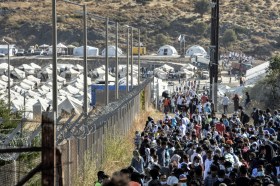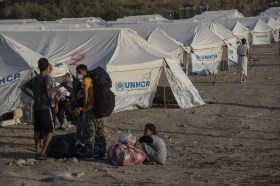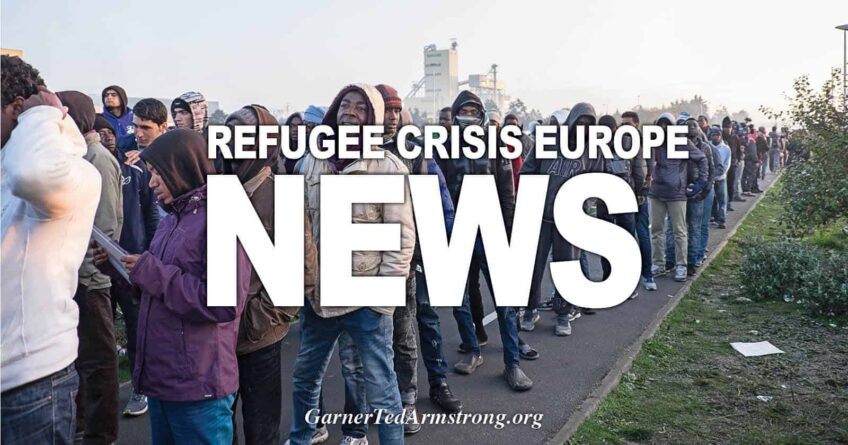
Human rights activists demonstrate outside the European Parliament in Brussels calling on EU member states to take in more refugees from Greek camps. A non-EU member, Switzerland is getting similar pressure from its cities. Keystone / Olivier Hoslet
As winter looms, various European cities want to take in refugees from the Moria migrant camp in Greece, but there are obstacles. In Switzerland, cities must take their cues from the federal government.
Since fires devastated the Moria migrant camp on the Greek island of Lesbos last month, several Swiss cities have shown their solidarity with the thousands of victims. There have been cash donations as well as appeals urging the federal government to speed up the acceptance of more migrants, in particular unaccompanied children.
Shocked at the sight of the Moria inferno, Zurich was the first city to launch the appeal, which was then relayed by the authorities in Geneva, Bern, and Lausanne. It was also taken up by smaller capitals, such as Fribourg and Delémont. “Switzerland must seize this opportunity” to respond to this “situation of extreme urgency,” the Geneva and Lausanne city councils enjoined.
Key partners
In calling for “greater commitment” from Switzerland, the cities are convinced that the public authorities can shift position lines, even more so at a time when the European Union is revamping its migration policy. Seeing themselves as “key partners” in Swiss asylum and integration policy – a prerogative of the federal government – the cities have waded into a debate that has been simmering in Europe since spring, stirred by the movement “CitiesMustAct”.
Launched following a pledge by the city of Berlin to take in 1,500 migrants to “relieve pressure on these horrendous camps”, CitiesMustAct aims to deliver a message to the authorities so that they review their migration policy and “support the immediate relocation” of migrants from the Greek islands.

Refugees wait next to the Kara Tepe camp in Lesbos, which was hastily built after the fire in Moria. Copyright 2020 The Associated Press. All Rights Reserved
Like Berlin, the eight largest Swiss cities (Zurich, Geneva, Basel, Lausanne, Bern, Winterthur, Lucerne, and St Gallen) did not wait for the Moria tragedy to express their readiness to welcome more migrants. Back in June, as the situation in the Aegean Sea worsened, several municipalities announced that they could take in “a large number of migrants quickly and efficiently”.
But were their voices heard? In Geneva’s city hall, impatience is mounting. “We have not yet received any feedback from the federal authorities,” laments deputy mayor Félicien Mazzola. “We are taking steps via the Union of Swiss Cities,” he continues, highlighting mayor Sami Kanaan’s concern about “the onset of specific problems linked to the winter season”.
Meanwhile, the State Secretariat for Migration (SEM) says it has taken note of the cities’ concerns, but that jurisdiction in matters of asylum lies strictly with the federal government. The minister responsible for legal implementation in this field, the head of the Federal Department of Justice and Police Karin Keller-Sutter, held talks with cantonal officials in mid-September. It emerged from these that Switzerland’s main priority was still providing humanitarian aid.
Forthcoming transfer
In addition to the delivery of emergency relief, around 20 children from Moria will soon be welcomed in Switzerland. “Their transfer is being organized,” confirms SEM spokeswoman Emmanuelle Jacquet von Sury, although the exact date of their arrival has not been set. “Earlier this year, our country already brought in, from Greece, 52 unaccompanied minor asylum seekers with family ties in Switzerland,” she adds.
As to whether the fixed number of 20 young migrants will be increased in light of the pressure from cities and the reshaping of European migration policy, the SEM is leaving the door ajar to a possible change of tack: “Should a long-term European relocation programme be put forward, the Federal Department of Justice and Police might examine possible participation.”
Emergency operation
In response to the fire, which left around 12,500 migrants homeless, the Swiss government quickly sent basic supplies to the site, together with relief workers accustomed to dealing with extreme situations. The operation ended on September 30, after access to drinking water had been restored for around 10,000 people.

Switzerland sent emergency supplies and relief workers to Lesbos following the fires in the Moria camp. Copyright 2020 The Associated Press. All Rights Reserved
Meanwhile, the Greek authorities have set up a new temporary registration and identification centre capable of lodging 10,000 refugees.
Already the day after the catastrophe, Keller-Sutter told the Swiss public broadcaster, SRF, that the government’s focus would be on providing humanitarian aid. “Swiss cities cannot offer sanctuary to migrants directly on their own initiative,” she said, stressing that it would be up to the cantons to distribute those taken into the cities that were most willing.
In late September, Neuchâtel’s cantonal parliament adopted an urgent resolution calling on the federal government to increase the quota of refugees accepted from the island of Lesbos. A large majority of members deemed that the number of 20 “does not live up to the Swiss humanitarian tradition”. The city of Neuchâtel has committed to taking in around 50 people.
Source: https://www.swissinfo.ch/eng/why-swiss-cities-can-t-welcome-moria-refugees-just-yet/46090958
[Disclaimer]







